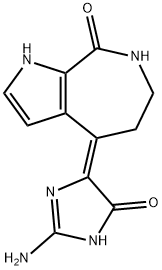Damaged DNA in humans is detected by sensor proteins that transmit a signal through checkpoint kinases (Chks) Chk1 and Chk2. Debromohymenialdisine (DBH) is a marine sponge alkaloid that inhibits Chk1 and Chk2 (IC50 = 3 and 3.5 μM, respectively), blocking G2 arrest. Because it does not significantly affect the activity of ataxia-telangiectasia mutated (ATM) or ATM-Tad2-related protein, DBH is a useful tool for studying the roles of Chk1 and Chk2 in DNA repair and cell cycle regulation. DBH also inhibits MAP kinase kinase 1 (IC50 = 881 nM), glycogen synthase kinase 3β (IC50 = 1.39 μM), cyclin-dependent kinase 5/p25 (IC50 = 9.12 μM), protein tyrosine kinase 6 (IC50 = 0.6 μM), and other kinases largely unrelated to DNA damage/repair and cell cycling.

